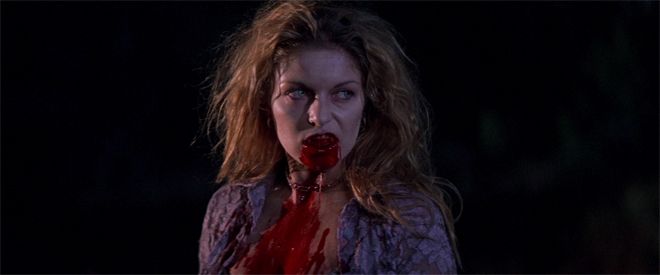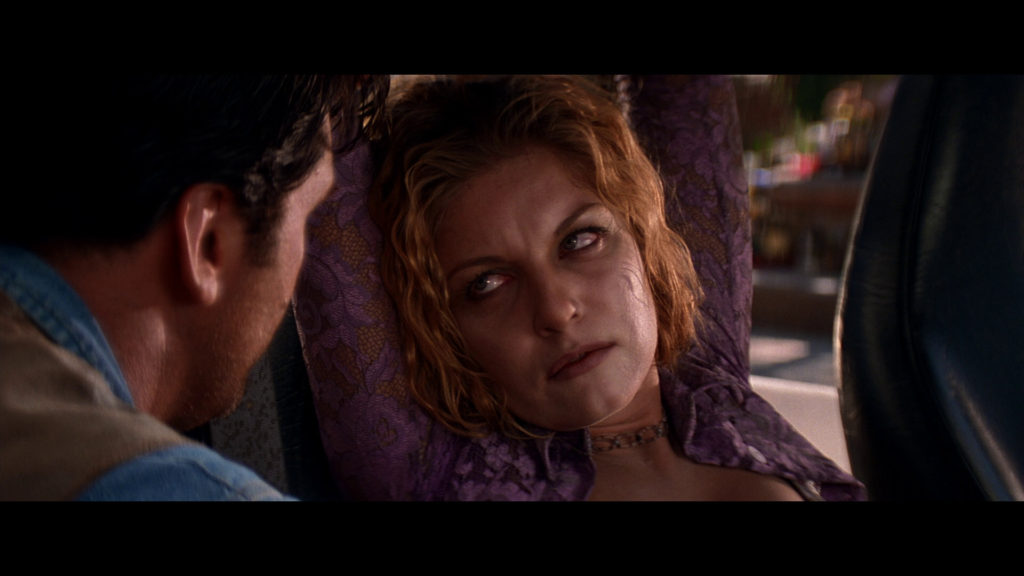This series looks back at the 1990s and its influence on the generation of people who came of age during the decade.
The last entry in my ongoing '90s series revisited Sheryl Lee's heartbreaking, harrowing performance in David Lynch's masterpiece of psychological torment, Twin Peaks: Fire Walk With Me (1992). That reminded me how, for a hot minute in the '90s, Lee seemed poised for big things. Her work in Twin Peaks was astonishing. Her raw, intense portrayal of the doomed Laura Palmer remains one of my favorite performances from the decade. My goodness, I thought, she truly was one of the most brave and committed actresses of that era, and I need to remind everyone just how great she was! So, because it's my mission to remind y'all that Lee was a force to be reckoned with, let's take a look at another of my favorite performances of hers from the '90s.
After Twin Peaks, Lee returned to the theater and over the years has stayed mostly under the radar on screen, appearing in a series of mostly unmemorable films and television shows. She recently reprised the role of Laura Palmer to great effect, in the beyond-weird Twin Peaks: The Return. Fire Walk With Me is likely her crowing achievement, but I'm also extremely fond of her work in another, later-'90s film. Once again, she was working for an iconoclastic director, and was charged with playing a woman victimized by supernatural forces beyond her control. A woman whose objectified body was also her currency. This time though, instead of facing the maniacal, possessing spirit BOB, Lee fell under a vampire's sway in John Carpenter's underrated, gonzo fangs-in-the-desert extravaganza Vampires (1998).
Few would rank Vampires among Carpenter's best, but that's because the man's best work is the unassailable stuff of legend. If you don't expect Vampires to compete with The Thing or Halloween or They Live, and just enjoy it on its own merits, then it's a bloody good time. I absolutely love it. Twenty years on, I'd even say it's a lost cult classic. In the grand tradition of independent, exploitation cinema, Carpenter has a blast mixing up a potent stew of vampires, sex, and Catholicism.
In accordance with the material, the acting is often gloriously over the top, as well. James Woods turns in a memorably hammy turn as the no-nonsense Vatican-sponsored vampire hunter Jack Crow. His partner Tony Montoya is played with taciturn smarminess by Daniel Baldwin. But this post is all about celebrating another fearless performance by Lee, this time as the prostitute-turned-vampire Katrina.
Lee's trademark scorching-hot intensity is on full display once more, as Katrina undergoes a slow transformation over the course of the film, from a hard-partying hooker to an undead siren with an appetite for blood. Her bloodlust escalates and Lee fully commits to Carpenter's classic exploitation film vibe. Not only does she commit, but she tears into it with a ferocity to match her character's voracious appetites. The film has some fun with the old vampirism-as-sex metaphor, and Lee especially makes solid gold out of it. Katrina is an unapologetic sexual being from the start, and then Lee only dials up the heat as she becomes more vampire than woman.
Katrina maintains a psychic link to the bloodsucker that bit her, Valek, making her a valuable asset to Crow and Montoya in their mission to bring down this grandmaster of the vampires. At first, Katrina can barely function, because she just got fanged by an uber-vampire (I told you, it's full-tilt boogie with the vampire-sex metaphor). The vampire transformation begins, and she stumbles through the desert in an intoxicated haze while Crow berates her and smacks her around. Few actresses can play stoned, somnambulance as believably as Lee. There's a natural melancholia to her heavy-lidded bedroom eyes that draws viewers in, almost hypnotically. We're entranced by the eyes to stick around, and then we're fully engaged by the artistry of her performances.
Over time, Katrina's vampire transformation only intensifies, and Lee delights in being as ferociously bad as she wants to be as the taste for blood increases. Sex and danger are the two key ingredients to any memorable vampire performance, and Lee brings both with maximum impact in Vampires. With a devilish smile and blood dripping down her chin, Lee is as scary-sexy as any vamp you'd have the pleasure to meet. She'd completely devour those sullen, sparkling-vampire Cullens of Twilight in a damn heartbeat, and I'd pay good money to see her do it.
Beyond just celebrating Lee's '90s work, I hope these last few posts have served as reminders that she was indeed quite good. She deserved bigger, better, meatier roles. Think of what she might have done with either of the lead parts in Single White Female. Or how about in the Kim Basinger role, as another wounded and fragile woman defined by her body, in L.A. Confidential? Also, she could have absolutely killed it as the object of Ben Affeck's affection in Chasing Amy. I don't believe she was ever in contention for any of these roles, but my point is, she should have been!
Instead though, she was starring in films and television series that no one remembers today. That's a shame. Lee had an utterly unique quality to her in the '90s—an ethereal yet intense combination of sadness and madness, pleasure and pain. She turned in truly electrifying performances in films like Fire Walk With Me and Vampires. I only wish we could've seen more of her during her prime.
Her resume might not show it, but Sheryl Lee was a major talent. These posts have been my small way of making sure we don't forget her talent today, looking back at the '90s from our twenty-first century vantage point.
Katrina maintains a psychic link to the bloodsucker that bit her, Valek, making her a valuable asset to Crow and Montoya in their mission to bring down this grandmaster of the vampires. At first, Katrina can barely function, because she just got fanged by an uber-vampire (I told you, it's full-tilt boogie with the vampire-sex metaphor). The vampire transformation begins, and she stumbles through the desert in an intoxicated haze while Crow berates her and smacks her around. Few actresses can play stoned, somnambulance as believably as Lee. There's a natural melancholia to her heavy-lidded bedroom eyes that draws viewers in, almost hypnotically. We're entranced by the eyes to stick around, and then we're fully engaged by the artistry of her performances.
Over time, Katrina's vampire transformation only intensifies, and Lee delights in being as ferociously bad as she wants to be as the taste for blood increases. Sex and danger are the two key ingredients to any memorable vampire performance, and Lee brings both with maximum impact in Vampires. With a devilish smile and blood dripping down her chin, Lee is as scary-sexy as any vamp you'd have the pleasure to meet. She'd completely devour those sullen, sparkling-vampire Cullens of Twilight in a damn heartbeat, and I'd pay good money to see her do it.
Beyond just celebrating Lee's '90s work, I hope these last few posts have served as reminders that she was indeed quite good. She deserved bigger, better, meatier roles. Think of what she might have done with either of the lead parts in Single White Female. Or how about in the Kim Basinger role, as another wounded and fragile woman defined by her body, in L.A. Confidential? Also, she could have absolutely killed it as the object of Ben Affeck's affection in Chasing Amy. I don't believe she was ever in contention for any of these roles, but my point is, she should have been!
Instead though, she was starring in films and television series that no one remembers today. That's a shame. Lee had an utterly unique quality to her in the '90s—an ethereal yet intense combination of sadness and madness, pleasure and pain. She turned in truly electrifying performances in films like Fire Walk With Me and Vampires. I only wish we could've seen more of her during her prime.
Her resume might not show it, but Sheryl Lee was a major talent. These posts have been my small way of making sure we don't forget her talent today, looking back at the '90s from our twenty-first century vantage point.











Comments
Post a Comment